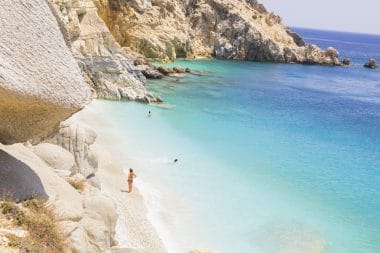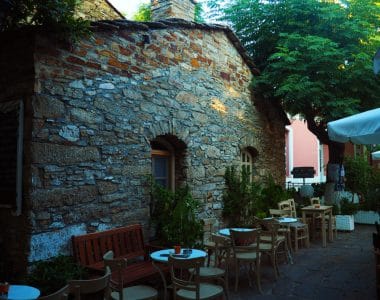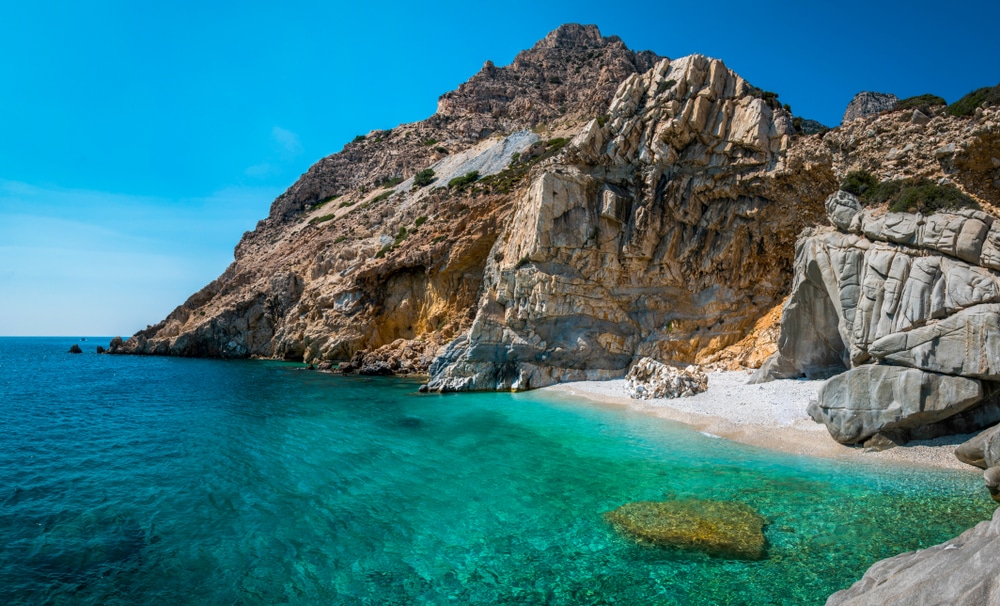On the Greek island of Ikaria, the mainland of Greece with its rules and regulations is very far away. The island is considered an island of free spirits and explorers, with a very autonomous and self-confident population that has not yet fully adapted to the many rules of mass tourism. This fits well into the history of the island, which has always been a place of festivals and traditions. Located closer to Turkey than to Greece, the cultures here mix in a unique way. Holidaymakers on the island also have the opportunity to explore many of the sights that have emerged throughout history.
A Greek island according to the old model
To this day, mass tourism stays away from Ikaria. This was due to the fact that there was no airport here for a long time and to this day no international lines can fly to the small island airport. On the other hand, there is comparatively little to see on Ikaria for the typical tourist. Nevertheless, since the end of the Second World War, efforts have been made to expand the infrastructure on the island and thus give visitors a chance to see every part of Ikaria. As a result, the island is very popular today, especially with individual tourists. They enjoy nature, which has not been greatly altered by tourism, and enjoy the comparatively simple life that can still be found here.
A special feature of the island – and perhaps one reason why it is still difficult to comply with the legal requirements from Athens – can be found in the more recent part of the story. During the Greek Civil War, many of the rebels were exiled to this island. Far away from the mainland, they had to live a comparatively simple and dreary life here and at the same time shaped the island’s culture today. If you ask yourself why the opening hours of the shops are arbitrary, why rules are more of a small guideline and why the residents celebrate their status as rebels, you probably have to look at this part of the story.
All this ensures that the island is just the right choice in Greece, especially for those who are looking for an adventure away from hotels and tourist services. Beautiful beaches, a pleasant climate, impressive people and a culture all of their own invite you to fully immerse yourself in Ikaria.
Ikaria – what to do?

A large part of the island is now accessible by car thanks to the measures taken to improve the infrastructure. However, there are comparatively few providers of rental cars, so you should book in good time. In addition, you should not expect that there is actually one city for tourists on the island. There are many small villages along the coast, all of which have somehow and sometimes only a little adapted to the travelers on the island. On the north coast, for example, there are the villages of Gialiskari and Armenistis, very close to the former capital of the island. This is where most of the beds on Ikaria can be found and therefore the small fishing villages are the starting point for most visitors.
Ikaria invites you to a relaxing holiday as well as an active holiday. Many small and large beaches allow you to simply let the sun shine on your belly and in the evening stop at one of the taverns and enjoy some of the great cuisine of the island. At the same time, the many small mountains and hiking trails are perfect for seeing a little more of the island. You may come across one of the monasteries, the famous caves or the former Temple of Artemis in the bay of Nas.

A special attraction on the island is the famous village of Christos Raches. Called Raches by the locals, it was the village where many of the exiles of the 40s gathered. The special feature is that the village actually only comes to life in the evening or even at night. If you arrive here in the afternoon, you will be surprised to find that the village is almost deserted. The shops open around 6 p.m., sometimes not until 8 or 10:00 p.m. But they stay open until late at night and the taverns in the village offer food and drink for a night full of memories.
What else do you have to experience on Ikaria?
All in all, it is an island that only deals marginally with the tourists. Hospitality is very important, but you don’t want to let the dynamics of the strangers dictate your life. This also leads to the fact that you can find very authentic Greek cuisine here, some of which are known throughout Greece. Due to the limited number of beds on the island, it is also advisable to book your own trip early.
Holidays in Ikaria: the most important information
Journey
- Airport: Ikaria National Airport (JIK), about 12 km southwest of the capital Agios Kirikos.
- Ferry: Regular ferry services from the Greek mainland and other Aegean islands. The main ferry port is Agios Kirikos.
Important telephone numbers
- Police: 100
- Fire brigade: 199
- Ambulance service: 166
- General emergency: 112
- Tourist Information Agios Kirikos: +30 22750 22323
Supermarkets
- Carrefour Express: Agios Kirikos
- AB Supermarket: Evdilos
- Lidl: Near Agios Kirikos
- Local Groceries: Small grocery stores in various villages such as Armenistis and Raches.
Doctors and hospitals
- Agios Kirikos:
- General Hospital of Ikaria: +30 22750 22222
- Evdilos:
- Medical Center Evdilos: +30 22750 31009
Important words with translation
- Hello – Γειά σου (Yiá sou)
- Thank You – Ευχαριστώ (Efcharistó)
- Please – Παρακαλώ (Parakaló)
- Yes – Ναί (Ne)
- No – Όχι (Óchi)
- Sorry – Συγγνώμη (Signómi)
- Where is…? – Πού είναι…? (Poú eínai…?)
- How much does it cost…? – Πόσο κοστίζει…? (Póso kostízei…?)
- Emergency – Έκτακτη ανάγκη (Éktakti anánki)
- Doctor – Γιατρός (Yatrós)
- Hospital – Νοσοκομείο (Nosokomío)
Holidays
- New Year’s Day: January 1
- Epiphany: January 6
- Independence Day: March 25
- Good Friday: variable (March/April)
- Easter Monday: variable (March/April)
- Labour Day: 1 May
- Assumption Day: 15 August
- National holiday: October 28
- Christmas: December 25
- St. Stephen’s Day: December 26
Opening hours
- Shops: Usually Monday to Saturday from 9:00 a.m. to 2:00 p.m. and from 5:00 p.m. to 9:00 p.m. Many shops are also open on Sundays, especially in the tourist season.
- Supermarkets: Usually daily from 8:00 a.m. to 10:00 p.m.
- Restaurants: Lunch from 12:00 to 15:00, dinner from 19:00 to 23:00.
- Banks: Monday to Friday from 8:00 a.m. to 2:00 p.m.
Things to see and do
- Therma Thermal Springs: Famous for their healing properties.
- Nas: Archaeological site and beautiful beach.
- Armenistis: Charming village with magnificent beaches.
- Chalasmena Raches: Traditional village with a unique way of life and a relaxed atmosphere.
- Agios Kirikos: Capital of the island with picturesque streets and historical charm.
- Hiking: Numerous hiking trails through untouched nature and breathtaking landscapes.
NUDISM
- Not officially, but tolerated: Some secluded beaches, such as Nas Beach, are known for unofficial nudist bathing.
Post / Stamps
- Agios Kirikos Post Office: Opening hours: Monday to Friday from 8:00 a.m. to 2:30 p.m.
- Stamps: Available at the post office and kiosks.
- Costs for letters and postcards to Germany: Standard letter up to 20g: approx. 0.90 EUR; Postcard: approx. 0.90 EUR
Safety
- Crime: Ikaria is considered very safe. Observe the usual precautions as in any small municipality.
- Emergency number: 112
Current
- Voltage: 230 volts
- Sockets: Type C and F (as in Germany)
Tip
- Restaurants: 5-10% of the bill amount, often included in the bill.
- Taxis: Round up the amount
- Hotels: 1-2 euros per day for cleaning staff
Customs
- Allowances within the EU: No customs restrictions on personal belongings.
- Alcohol: Maximum 10 liters of spirits, 20 liters of alcoholic beverages with less than 22%, 90 liters of wine, 110 liters of beer.
- Tobacco: 800 cigarettes, 400 cigarillos, 200 cigars, 1 kg of tobacco.


